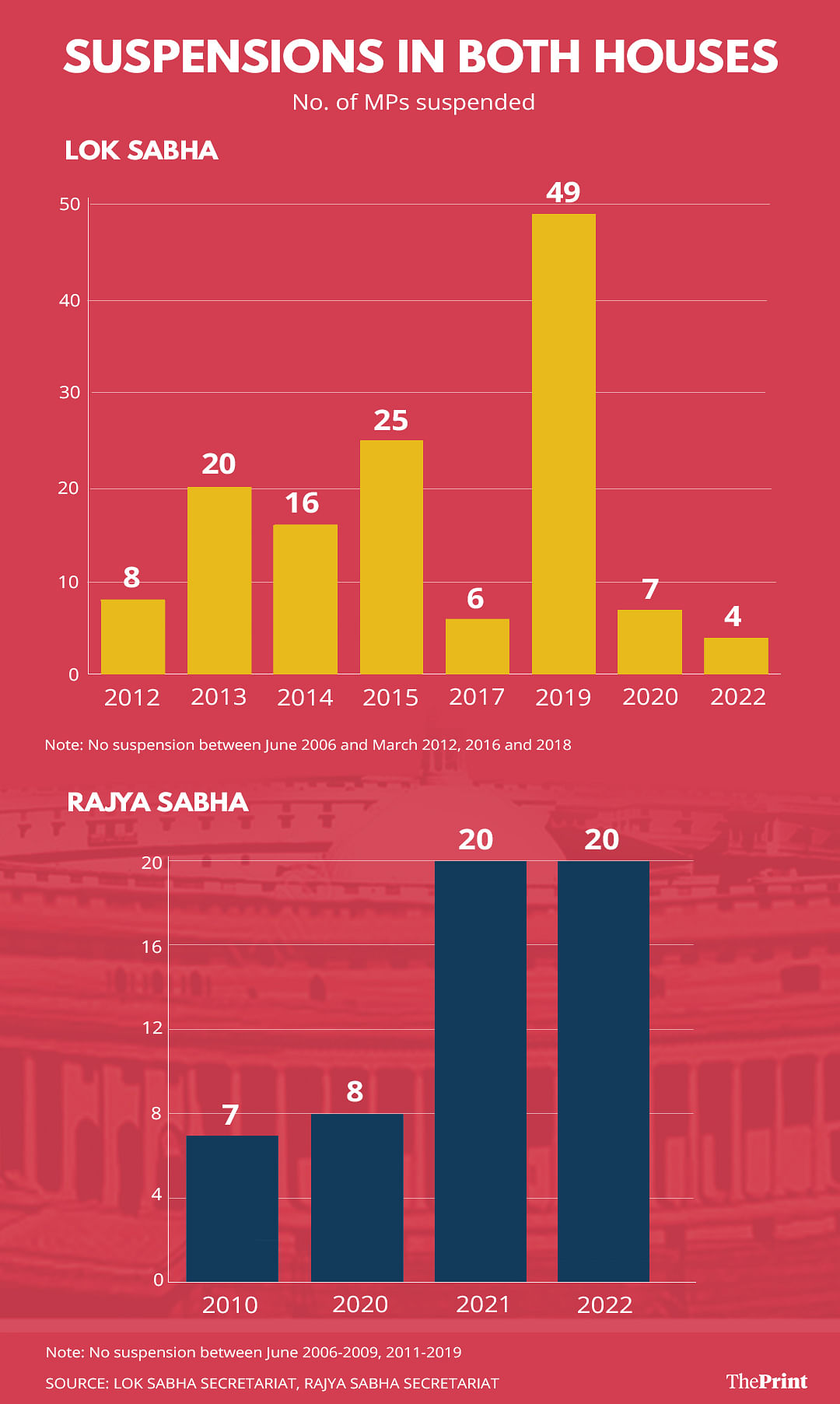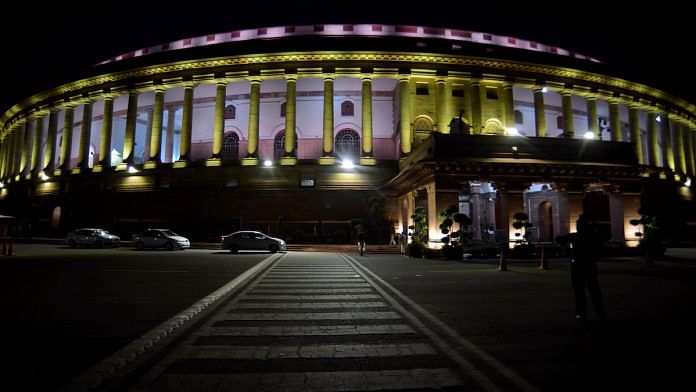New Delhi: The number of MPs suspended from both Houses of Parliament in the eight years since 2014 — when the Bharatiya Janata Party (BJP)-led National Democratic Alliance rose to power — has gone up almost three times compared to the previous eight years, data accessed by ThePrint from the Lok Sabha and Rajya Sabha Secretariats shows.
While at least 51 MPs were suspended from the two Houses between the monsoon session in 2006 and February 2014 (the Lok Sabha elections were held in April 2014), at least 139 MPs have been suspended for misconduct and unruly behaviour between the monsoon session in August 2015 and now.
On Monday, 4 opposition MPs were suspended from the Lok Sabha, and this was followed by 20 MPs being suspended from the Rajya Sabha Tuesday and Wednesday for disrupting proceedings.
Parliamentary experts as well as opposition MPs agree that there has been a huge spike in suspension cases in the past few years, unlike earlier, when such instances were few and far between.
P.D.T. Achary, former secretary general of the Lok Sabha, told ThePrint: “Of late, cases of MPs getting suspended have more than doubled. It indicates that there is great hostility between the treasury and opposition benches, where both treat each other as enemy instead of political adversary.”
Not only does this impede the smooth functioning of Parliament, where bills are being passed without any discussion, the growing animosity also does not augur well for a parliamentary democracy, Achary said.
“It’s a sign of a serious crisis…. Parliament cannot function like this. Earlier, there used to be healthy interactions among members of both sides. There was a lot of bonhomie. It was a sign of a mature democracy. That tradition of interactions is breaking down now,” he added.
Rajya Sabha MP and former finance minister P Chidambaram told ThePrint that the Narendra Modi government is “strangling democracy” by not allowing any discussion or debate in Parliament.
“If debate is not allowed and if protest is not allowed, why have democracy, elections, and a Parliament? The government is strangling democracy. It is dying a slow death. Let all citizens be aware of the danger,” he said.
Chidambaram cited the suspension of 19 opposition MPs from the Rajya Sabha Tuesday as an example, saying, “The deputy chairman said the 19 MPs were suspended because of their ‘misconduct’ in the House. He should have asked what ‘conduct’ of the government caused the alleged ‘misconduct’.”
“The government was guilty of grave damage to parliamentary rules and traditions when it refused to agree to a debate on price rises, the misuse of investigative agencies and the hooch tragedy in Gujarat. In the face of such obduracy, what choice does the opposition have except to protest outside and inside the House,” he asked.
However, the ruling BJP disagrees with this view. Speaking to ThePrint, Anil Baluni, Rajya Sabha MP and national media in-charge of the BJP, alleged that the opposition deliberately does not allow the House to function despite the government being ready to have a discussion on all matters.
“The House has been getting disrupted regularly and even those members who are trying to raise issues related to the public are being regularly disrupted by some MPs. This is simply unacceptable. They are carrying placards inside the House, something which is not allowed. We tried several times to reach out but in vain. Parliament is a place for raising issues related to people, their problems, and to have discussions on policy issues, but for so many days it has come to a complete standstill,” he said.
Also read: MPs are getting lost — in labyrinthine Parliament where departments have changed places
170% surge in suspension cases since Modi govt came to power
While there were five instances between 2006 and February 2014 when some 51 MPs were suspended, the number of such suspensions has gone up in the two Houses by almost three times since then.
In the Rajya Sabha, the suspension cases have increased especially during the second term of the Modi government, from 2019 onwards.

According to Parliament’s Rules of Procedure and Conduct of Business, the House (Lok Sabha and Rajya Sabha) has the right to punish its members for misconduct in the House or outside.
In cases of misconduct or contempt committed by the members, the House can impose punishment in the form of admonition, reprimand, withdrawal from the House, suspension from the service of the House, or imprisonment and expulsion from the House.
In the Rajya Sabha, Rule 256 governs the suspension of members. A motion is moved by the chair and adopted by the House to suspend the member from the service of the House for a period not exceeding the remainder of the session. The House may, however, terminate the suspension by another motion.
The Rajya Sabha also has a provision under Rule 255, where the chairman may direct any member whose conduct is, in his opinion, grossly disorderly to withdraw immediately from the House for the remainder of the day’s meeting.
Several MPs in the Rajya Sabha have been directed to absent themselves from the House for a day under Rule 255, but it’s not considered as severe a punishment as suspension.
In the Lok Sabha, suspension is carried out under Rule 374 and 374 (A), which gives power to the Speaker to suspend a member, either by moving a motion or on their own authority.
Spate of suspensions from Rajya Sabha in Modi govt’s 2nd term
Data gathered by ThePrint from the Rajya Sabha and Lok Sabha secretariats and their respective websites for the eight years preceding the NDA government — 2006 to 2014 — and the eight years of the BJP-led NDA government from 2014 till now, shows that suspending MPs has become more of a norm than an exception.
In the Rajya Sabha, for instance, during the period 2006-2014, there was just one episode in March 2010 when the then minister of state for parliamentary affairs, Prithviraj Chavan, moved a motion on 9 March for the suspension of seven MPs for the remaining part of the 219th session.
The MPs had snatched the women’s reservation Bill from a minister and thrown copies of the Bill inside the House. However, another motion was moved on 15 March to terminate the suspension of all but one member, Dr Ejaz Ali.
The Rajya Sabha did not see any suspensions during the Modi government’s first term in power (2014 to 2019), when the ruling party had fewer seats in the Upper House. However, there has been a spate of suspensions since 2020, reflecting the growing strain between the treasury and opposition benches.
In September 2020, eight opposition MPs were suspended during the passage of two of the controversial farm bills. The eight suspended MPs sat on a night-long dharna inside Parliament’s premises in protest against the two bills, but called off their demonstration the next day to join the opposition in boycotting the rest of the monsoon session.
In July 2021, Trinamool Congress (TMC) Rajya Sabha MP Shantanu Sen was suspended for snatching IT minister Ashwini Vaishnaw’s papers. Again, in August 2021, six TMC MPs were suspended for a day for protesting over the alleged Pegasus snooping scandal.
The trend of suspensions continued during the 2021 winter session too. In November, 12 opposition MPs were suspended from the Upper House for the entire session for “unprecedented acts of misconduct” on 11 August, the last day of the previous monsoon session. This was the first time that such a large number of MPs were suspended for unruly behaviour during the previous session.
“This is unprecedented in Parliament’s history. MPs were suspended from the House for creating ruckus in the previous session,” Achary said.
Again, in December 2021, the Trinamool Congress’s parliamentary leader in the Rajya Sabha, Derek O’Brien, was suspended for the entire session.
But the suspension of 20 opposition MPs from the Rajya Sabha on Tuesday and Wednesday has set a new record. By far, this is the highest number of MPs ever suspended from the Upper House in a matter of days.
O’Brien said the BJP-led NDA government is turning Parliament into a “deep, dark chamber” where nobody gets to know what is happening inside.
“Opposition MPs are getting suspended for the whole session for protesting and holding placards. In a vibrant democracy, if opposition members do not protest, who will? The spate of suspensions in both Houses of Parliament in recent times shows how both democracy and Parliament are being suspended in India by people who are running away from discussion on key issues like price rises and economic blockade. Just think, who benefits when Parliament is suspended,” he asked.
Huge uptick in suspensions from Lok Sabha since 2014
The most notable and first large-scale suspension of MPs in the Lok Sabha took place over three decades ago, in March 1989. Some 63 MPs were suspended for three days for disrupting the House over the Thakkar Commission Report, which looked into the assassination of former PM Indira Gandhi. But the suspension was revoked a day after, when the MPs apologised to the chair.
Data shows that since May 2014, when the Modi government took charge for the first time, there has been a string of suspensions of Lok Sabha MPs almost every year when the House was in session.
According to records maintained by Lok Sabha Secretariat, while there were four instances between 2006 and 2014 — April 2012, August 2013, September 2013 and February 2014 — which resulted in a total of 44 MPs being suspended from the Lok Sabha for unruly behaviour, as many as 91 MPs have been suspended since the BJP-led NDA came to power at the Centre in 2014.
August 2015 saw the greatest number of MPs were suspended in a single day day, when 25 MPs were suspended by then speaker Sumitra Mahajan for five days. Opposition MPs protesting over the Vyapam scam and the Lalit Modi row had entered the well of the House carrying placards. They were demanding the resignation of Madhya Pradesh CM Shivraj Singh Chouhan, then Rajasthan CM Vasundhara Raje Scindia and then external affairs minister Sushma Swaraj.
In July 2017, six Lok Sabha MPs were suspended for five days. Again, in 2019, the Lok Sabha witnessed a large number of suspensions. Some 45 MPs belonging to the All India Anna Dravida Munnetra Kazhagam, Telugu Desam Party and the YSR Congress Party were suspended over two days for disrupting proceedings, demanding special status for Andhra Pradesh, and protesting over a proposed dam on Cauvery river. On January 2, 2019, the Lok Sabha saw the suspension of 24 MPs for five days, and a day later, another 21 MPs were suspended for four days.
Chaksu Roy, head of outreach at the Delhi-based PRS Legislative Research, which tracks the functioning of India’s Parliament, told ThePrint that “MPs disrupting Parliament and their suspension from the House are becoming routine affairs, irreparably damaging our parliamentary ethos”.
“Political parties need to resolve their differences outside the legislative chamber without stalling the functioning of our national legislature. Disruptions and suspensions tarnish the image of Parliament and raise serious questions about the maturity of its functioning,” Roy said.
The BJP’s Baluni, when asked about the opposition’s claim that such suspensions have become the norm during the BJP’s tenure, said: “We should not forget how work used to be done during their tenure; they had no respect for constitutional institutions. If I start recounting, they will not have anything left to say.”
This report has been updated to correct a typo
(Edited by Nida Fatima Siddiqui)
Also read: BJP set to become ‘Muslim-free’ in Parliament when RS terms of Naqvi, Islam, Akbar end



